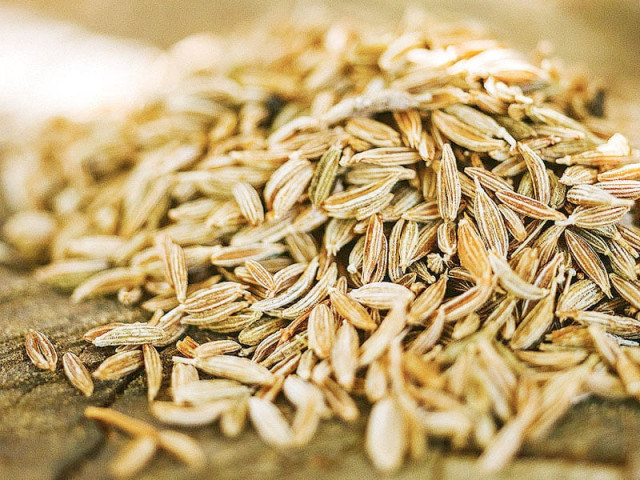
Being a key component of curry powder, zeera is readily consumed locally for digestion and taste but we might be taking it for granted. As compiled from whfoods.com, livestrong.com, Huffington Post and Prevention magazine, here are a few health benefits of the wonder spice.
Prevents anaemia
Cumin seeds contain generous amounts of iron - with each teaspoon providing four milligrams of the mineral, or 22 per cent of the daily value. Iron being an essential element for the formation of haemoglobin in the blood required for the transport of oxygen. The condition of anaemia lowers the levels of haemoglobin in the blood and that has always been a concern in women, children and adolescents. It’s a good idea to include zeera in everyday preparations like parathas, curries, cookies, soups, and lentil preparations.
Controls diabetes
In a study published in the journal Nutrition Research, the research team found that cumin seeds helped diabetic patients by controlling their blood sugar. The patients experienced a reduction in hypoglycaemia, or low blood sugar - a condition common in diabetics and glucosuria, in which the urine contains too much glucose. A review of scientific studies published in 2005 in the International Journal of Food Science and Nutrition confirmed that cumin aids hypoglycaemia and is highly recommended for blood sugar control.
Boosts memory power
The Pakistani kitchen staple has also been found to increase the memory of a person. The seeds boasted mind-sharpening potential in a study published in the Journal of Ethnopharmacology. Cumin’s antioxidant, anti-inflammatory, and neuron-protecting properties are responsible for the brain-boosting results. Also rich in essential oils, zeera has been linked to brain-stimulating benefits, and helps halt the breakdown of the neurotransmitter acetylcholine, which medical herbalist Kevin Spelman, PhD, says is a well-established pharmaceutical method for recuperating memory. It helps in maintaining acetylcholine in the brain which helps in retaining memory.
Nourishes skin
High in Vitamin E, the super spice helps keep the skin healthy and youthful. Cumin also has anti-microbial properties which helps skin from fungal and viral infections. In a study conducted by Iranian researchers, they found that its paste can be applied on boils, pimples, eczema, psoriasis and various other skin related diseases for quick healing. Also a source of dietary fibre, cumin helps in the cleaning process and removes toxins. Vitamins present in cumin triggers the anti-aging processes in the body. Cuminaldehyde and phosphorous in cumin are natural detoxicants that helps the in reducing wrinkles, making skin smooth and supple.
Prevents common cold
Because of its antiseptic and anti-microbial properties, zeera keeps various viral infections at bay. It helps in boosting the immunity of the body. Cumin has been found to be very beneficial for the respiratory organs especially the lungs. Because of its warm nature it helps in suppressing the mucus formation that gives rise to colds. A cold can be prevented by taking cumin as it contains Vitamin-C and iron – a mineral combo that improves immunity and keeps infections away. They provide a great relief when the seeds are taken along with hot water, basil leaves and honey. Sore throat, flu and other viral infections are also prohibited by it.
Inhibits cancer cells
Cumin is rich in antioxidants and various essential oils. They help in the secretion of anti-carcinogenic enzymes from the glands and helps in preventing the growth of cancerous cells by altering their biological behaviour. It is known to provide strong radical scavenging activity. Eugenol and limonene in cumin possess strong anti-tumour properties. They are helpful in preventing colon, breast, liver and stomach cancer, according to research by Zheng, Kenney, and Lam et al in the journal of the American Dietetic Association.
Kills bacteria
Cumin not only improves the flavour of dishes but prevents bacterial growth in the foods its added to, according to research conducted by the Cornell Chronicle. Ground cumin is among the more potent spices for killing bacteria in foods, such as meat, lentils, rice and vegetables. Traditionally used in Pakistan to reduce food spoilage, ground cumin is also effective in killing Staphylococcus aureus bacteria that have infected wounds in humans, according to a study published in Oman Medical Journal.
Compiled By: Umnia Shahid
Published in The Express Tribune, January 29th, 2015.
Like Life & Style on Facebook, follow @ETLifeandStyle on Twitter for the latest in fashion, gossip and entertainment.


















COMMENTS
Comments are moderated and generally will be posted if they are on-topic and not abusive.
For more information, please see our Comments FAQ